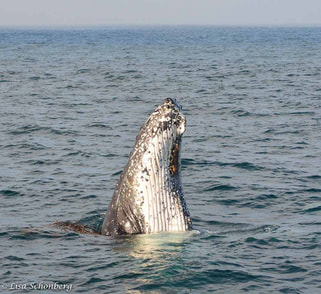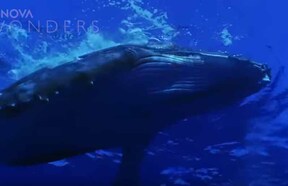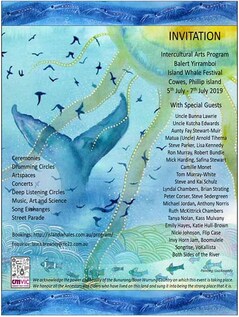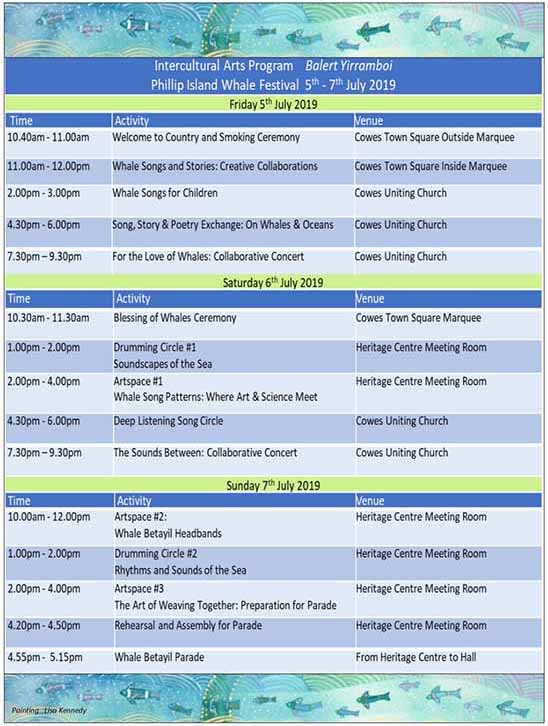 Photo: Lisa Schonberg
Photo: Lisa Schonberg Dr Laura Brearley
THE whale migration season off Phillip Island has begun again and the texts have started to arrive:
We live at Cape Woolamai and although I was deep in work when this third message came through, I answered what I felt was a call to action. When I arrived at Anzacs Beach at Cape Woolamai, the car park was full. A crowd of people was standing looking out to sea. There were families with children. People who had never met before were talking and laughing together. Just as I had, everyone there had dropped what they were doing when that text came through. Excitement was in the air and it felt like a shared experience of connection with the whales, as well as with one another.
THE whale migration season off Phillip Island has begun again and the texts have started to arrive:
- Wednesday May 29, 9.45am. First Island whales this season. Two whales off San Remo jetty, heading to Cape Woolamai.
- Tuesday, June 4, 3.31pm. One humpback sighted 1.4 kms of the Nobbies, heading towards Pyramid Rock.
- Friday, June 7, 10.48am. One humpback whale, close to shore at Cape Woolamai.
We live at Cape Woolamai and although I was deep in work when this third message came through, I answered what I felt was a call to action. When I arrived at Anzacs Beach at Cape Woolamai, the car park was full. A crowd of people was standing looking out to sea. There were families with children. People who had never met before were talking and laughing together. Just as I had, everyone there had dropped what they were doing when that text came through. Excitement was in the air and it felt like a shared experience of connection with the whales, as well as with one another.
I’ve noticed this sense of connection on whale cruise boats too. We board the boats as individuals and when the first whales are sighted, any separateness between passengers seems to dissolve. We sing and clap and whistle to the whales, reaching out to them together. Sometimes, they’ll swim along with us, even diving under the boat. If they’re feeling playful, they seem to dance in the water, breaching and splashing with their bodies and tails. It’s a profound experience to be part of that joyful play.
The whale at Cape Woolamai a few days ago was surfacing from time to time. I found it moving to see a whale in this early stage of the season and to know that the age-old cycle of the whale migration was underway again. With all the human interference in the natural world and the damage done, the rhythm of the migration endures. It is larger than all of us and that is a wonderful thing.
The whale at Cape Woolamai a few days ago was surfacing from time to time. I found it moving to see a whale in this early stage of the season and to know that the age-old cycle of the whale migration was underway again. With all the human interference in the natural world and the damage done, the rhythm of the migration endures. It is larger than all of us and that is a wonderful thing.
 Whale Songs in the South Pacific
Whale Songs in the South Pacific Humpback whale research
Over the past few weeks, I have been in touch with members of a team of international scientists who have been undertaking research on whale songs for many years (https://www.youtube.com/watch?v=P99CR4y-TYw&feature=youtu.be). Led by Dr Ellen Garland (St Andrews University, Scotland) and Dr Jenny Allen (Griffith University, Queensland), the research has been tracking how the songs of humpback whales are transmitted over time and distance in the Pacific Ocean. The two lead researchers, Dr Ellen Garland and Dr Jenny Allen, have both expressed interest in the intercultural arts program of the 2019 Island Whale Festival.
Their research has shown that whale songs are communicated across the South Pacific, moving from populations of eastern Australia in the west to French Polynesia in the east. The whale songs appear to come originally from the Indian Ocean, west of Australia, representing a transmission of almost 10,000 kilometres. The research team has found that thousands of male humpbacks can synchronously change their song to a new version introduced from a neighbouring population in as little as two months. Their research in song learning has revealed that humpback whales employ some of the same learning strategies as songbirds and humans when acquiring a new song.
Over the past few weeks, I have been in touch with members of a team of international scientists who have been undertaking research on whale songs for many years (https://www.youtube.com/watch?v=P99CR4y-TYw&feature=youtu.be). Led by Dr Ellen Garland (St Andrews University, Scotland) and Dr Jenny Allen (Griffith University, Queensland), the research has been tracking how the songs of humpback whales are transmitted over time and distance in the Pacific Ocean. The two lead researchers, Dr Ellen Garland and Dr Jenny Allen, have both expressed interest in the intercultural arts program of the 2019 Island Whale Festival.
Their research has shown that whale songs are communicated across the South Pacific, moving from populations of eastern Australia in the west to French Polynesia in the east. The whale songs appear to come originally from the Indian Ocean, west of Australia, representing a transmission of almost 10,000 kilometres. The research team has found that thousands of male humpbacks can synchronously change their song to a new version introduced from a neighbouring population in as little as two months. Their research in song learning has revealed that humpback whales employ some of the same learning strategies as songbirds and humans when acquiring a new song.

Creative responses
With the support of local First Nation community members, Bass Coast Shire Council, Destination Phillip Island, Community Music Victoria, Cowes Uniting Church, we are currently organising the intercultural arts program ‘Balert Yirramboi’ of the Island Whale Festival in Cowes on July 5-7.
A talented group of musicians, artists and cultural advisors will come together to help celebrate the whales through song, story, dance and collaborative art-making. Activities will include ceremonies, drumming circles, music and dance, song circles, song exchanges, concerts, a street parade and a collaborative artspace that weaves together music, art and science.
Jazz pianist Steve Sedergreen is composing music in response to the scientific whale song research. He will perform his new composition with his long-time collaborators Wamba Wamba didgeridoo player Ron Murray and jazz drummer Mike Jordan.
Camille Monet, who is coordinating the collaborative artspace, will facilitate arts activities in response to the whale song research. Participants will be invited to create visual responses to the whale songs, making patterns on long sheets of paper which will be carried in the whale parade at the end of the festival. Aunty Fay Stewart-Muir has generously gifted local Boon Wurrung language to a whale song cycle that I have composed and that Trawlwoolway artist Lisa Kennedy has illustrated.
Invitation
If you love whales and are interested in creative collaborations, song-writing, poetry or story-telling, you are invited to share your ideas and contribute to the arts program.
If you are seeking inspiration, you may wish to reflect on some core questions:
If you would like to make a creative contribution, please email [email protected] by June 28 with your contact details and a brief description of what you would be interested in sharing. The program has been designed with activities in which creative exchanges and collaborations can occur. The copyright of all material will remain with the contributing artists.
The full program of the Island Whale Festival is at http://islandwhales.com.au/program/. Many events are free and bookings for ticketed activities can be made online.
And … next time you hear there are whales nearby, stop what you are doing and take some time to feel the gift of their presence. I suspect they will feel you too.
Laura Brearley is co-ordinator of the intercultural arts program of the Island Whale Festival.
With the support of local First Nation community members, Bass Coast Shire Council, Destination Phillip Island, Community Music Victoria, Cowes Uniting Church, we are currently organising the intercultural arts program ‘Balert Yirramboi’ of the Island Whale Festival in Cowes on July 5-7.
A talented group of musicians, artists and cultural advisors will come together to help celebrate the whales through song, story, dance and collaborative art-making. Activities will include ceremonies, drumming circles, music and dance, song circles, song exchanges, concerts, a street parade and a collaborative artspace that weaves together music, art and science.
Jazz pianist Steve Sedergreen is composing music in response to the scientific whale song research. He will perform his new composition with his long-time collaborators Wamba Wamba didgeridoo player Ron Murray and jazz drummer Mike Jordan.
Camille Monet, who is coordinating the collaborative artspace, will facilitate arts activities in response to the whale song research. Participants will be invited to create visual responses to the whale songs, making patterns on long sheets of paper which will be carried in the whale parade at the end of the festival. Aunty Fay Stewart-Muir has generously gifted local Boon Wurrung language to a whale song cycle that I have composed and that Trawlwoolway artist Lisa Kennedy has illustrated.
Invitation
If you love whales and are interested in creative collaborations, song-writing, poetry or story-telling, you are invited to share your ideas and contribute to the arts program.
If you are seeking inspiration, you may wish to reflect on some core questions:
- Why do you love whales?
- What do whale songs stir in you?
- What does the sense of connection with whales feel like for you?
- If you had a message to send to the whales, what would you say or sing to them?
If you would like to make a creative contribution, please email [email protected] by June 28 with your contact details and a brief description of what you would be interested in sharing. The program has been designed with activities in which creative exchanges and collaborations can occur. The copyright of all material will remain with the contributing artists.
The full program of the Island Whale Festival is at http://islandwhales.com.au/program/. Many events are free and bookings for ticketed activities can be made online.
And … next time you hear there are whales nearby, stop what you are doing and take some time to feel the gift of their presence. I suspect they will feel you too.
Laura Brearley is co-ordinator of the intercultural arts program of the Island Whale Festival.
